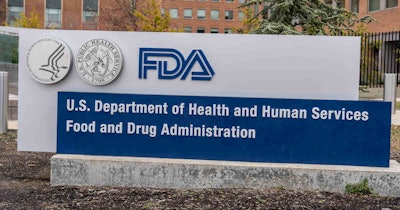
While laboratory developed test (LDT) regulatory reform through rulemaking in the U.S. has caused waves of angst among independent commercial laboratories, a quieter effort points to the U.S. Food and Drug Administration's (FDA) first target for wrangling bad tests in the market: LDTs that identify cancer biomarkers and are used to influence patient treatment decisions.
In June 2023, the FDA quietly launched a voluntary pilot program for certain oncology drug products used with certain corresponding in vitro diagnostic (IVD) tests, also called companion diagnostics (CDx). The program could start producing results after July with industry guidance for LDTs used in oncology testing.
Among the aims of the FDA's LDT pilot program are to make transparent performance recommendations for diagnostic tests used to select certain oncology drug treatments, reduce the risks of using CDx for oncology drug treatment decisions, and create a focus while the FDA works on its broader approach to LDT oversight, according to the FDA.
“We believe this guidance and the launch of the pilot program are important steps towards addressing safety risks posed by the use of poorly performing laboratory developed tests,” said Dr. Jeff Shuren, JD, director of the FDA’s Center for Devices and Radiological Health, in the announcement.
LDT proposed rule cited adverse events reports, complaints
Troubling complaints, adverse event reports, and other allegations identifying problems with LDTs were cited in the FDA's proposed rule for LDT oversight in 2023.
Noted were lawsuits against laboratory manufacturers for false and misleading statements about test efficacy, including some related to pharmacogenetic tests, and inaccurate results from an oncology IVD offered as an LDT that predicts risk of breast cancer recurrence and informs the decision to pursue chemotherapy, among other situations with serious implications.
Collectively, that information "though anecdotal, points to potential problems among IVDs offered as LDTs, the scope and scale of which FDA cannot fully assess or address without phasing out the general enforcement discretion approach for applicable requirements (such as adverse event reporting)."
As LabPulse.com has reported, the FDA has offered a five-stage, five-year plan for phaseout of its general enforcement discretion approach for LDTs. The planned phase-out would begin with changes to adverse event medical device reporting (MDR). It would then address quality systems, premarket review, investigational use, and more at stage intervals from two to five years from the date of final policy related to each stage.
Special considerations
On an industry call, FDA associate director for scientific and regulatory programs in the Center for Devices and Radiological Health (CDRH) Elizabeth Hillebrenner indicated there could be special considerations for academic medical center laboratories and small laboratories.
In addition, guidance for research use only (RUO) products, establishing clinical validity for LDTs already on the market, device design controls for LDTs, and package inserts requirements for LDTs would be forthcoming in targeted guidance and additional resources on these specific topics, according to Hillebrenner.
CAP recommends exclusions
One of the leading voices in clinical laboratory accreditation and standards, the College of American Pathologists (CAP), has asked that some categories of LDTs continue under the FDA’s enforcement discretion policies. The CAP made clear that it does not support the proposed rule in its current form, CAP president Dr. Donald Karcher stated in a letter to the FDA dated December 4, 2023.
Exempting certain tests currently offered will ensure continuity of care and a smoother transition, with adequate time for the agency to educate clinical laboratories on the regulatory requirements and processes such as risk classifications, Karcher explained in the letter. The following were recommended for continued enforcement discretion:
- Exempt tests offered prior to the rule’s enactment
- Forensic, human leukocyte antigen (HLA), manual tests
- LDTs developed and offered locally by a clinical laboratory
- Adverse events reporting
- Quality systems (QS)
- Corrective action and removal
- Labeling
"Although there are currently many thousands of LDTs used in clinical care, most clinical laboratory tests performed today are low or moderate-risk and rely on packaged test systems produced by independent manufacturers and sold to laboratories," Karcher wrote. "The large majority of LDTs are used 'locally' within a hospital or health system and not marketed nationwide."
Karcher's letter also called out the proposed rule's assertion that the quality of molecular oncology testing LDTs is poor, saying that the rule references old data. "A significant number of laboratories modify FDA-approved platforms to include gene targets that have become standard of care but are not yet FDA-approved."
The CAP recommended all LDTs offered prior to the rule’s enactment to continue under FDA’s enforcement discretion policy. This and other key recommendations about LDT policy can be analyzed here.
Furthermore, CAP Today published a forum response about the situation.
"I can't think of a single, broader stroke of overhead you could throw at the laboratory industry than this proposed approach," Dr. Peter Dysert, chief of the department of pathology at Baylor Scott & White Health in Dallas, told CAP Today.
Danville, PA-based Geisinger Medical Laboratories' Donna Wolk, MHA, PhD, division chief of molecular and microbial diagnostics and development, said the FDA's intentions would have a critical impact on pediatric testing.
"Laboratory-developed tests and modified LDTs are often required for pediatric testing for infectious diseases because many manufacturers do not include children in the FDA clearance of the product," Wolk told CAP Today. Wolk also said the FDA does not have a grasp on hospital medical laboratories and that acute care hospitals will be harmed by the FDA proposal.
AdvaMedDx position
In a statement also issued December 4, medtech industry advocate and policy division AdvaMedDx gave a nod to the Verifying, Accurate, Leading-Edge IVCT Development (VALID) Act. VALID "or similar legislation" could optimize FDA’s ability to establish a comprehensive, unified, modernized, diagnostics-specific, risk-based regulatory framework for all IVDs, including those manufactured by a laboratory, regardless of where they are developed, separate from medical devices," according to Zach Rothstein, executive director of AdvaMedDx, a division of the Advanced Technology Association (AdvaMed).
Additionally, Rothstein stated that "numerous financial analysts and even some LDT developers have indicated that regulatory clarity and certainty is likely to encourage further investment in novel diagnostic tests and that the Proposed Rule will not significantly impede the ability of LDTs to reach the market."
CLIA not the answer
In a strong response to the deluge of feedback against and some nods in support of the FDA's intent, the FDA and CMS released a joint statement January 18. The FDA's Shuren and Dr. Dora Hughes, MPH, acting chief medical officer and acting director of the Center for Clinical Standards and Quality at CMS, confirmed the direction of how they plan to move forward in 2024.
"The FDA and CMS both provide oversight to help assure the accuracy of test results, however, they have different roles," Shuren and Hughes wrote. Shuren has been outspoken about LDTs for a decade now. Hughes, who is on faculty at George Washington University's School of Medicine and Health Sciences, previously served as chief medical officer at the Center for Medicare and Medicaid Innovation (CMMI) and as a senior policy advisor at Sidley Austin, where she advised on regulatory and legislative matters in the life science industry.
"CMS regulates laboratories that perform testing on individuals in the U.S. through the Clinical Laboratory Improvement Amendments of 1988 (CLIA) by establishing quality standards for all laboratory testing to help ensure the accuracy, reliability and timeliness of patient test results," the joint statement explained. "CMS does not have the expertise to assure that tests work; the FDA does. ... The FDA and CMS have long stood together in mutual support of FDA oversight of the analytical and clinical validity of LDTs. ... Some have suggested that concerns with LDTs should be addressed through expansion of CLIA. This is not the answer."
Applying the same oversight approach to laboratories and nonlaboratories that manufacture tests would better assure the safety and effectiveness of LDTs and would remove a disincentive for nonlaboratory manufacturers to develop novel tests that can be available to and used by many laboratories for many patients, the FDA-CMS joint statement continued, adding that the framework used by CMS is complementary to the medical device framework used by the FDA.
Regulatory impact analysis
The FDA's proposed rule will, if finalized, amend the FDA’s regulations in part 809 (21 CFR part 809) to make explicit that “in vitro diagnostic products” (IVDs) are devices as defined in section 201(h)(1) of the Federal Food, Drug, and Cosmetic Act (FD&C Act) (21 U.S.C. 321(h)(1)), including when the manufacturer of the IVD is a laboratory.
While the FDA offers a regulatory analysis claiming annualized benefits over 20 years would range from $2.67 billion to $86.01 billion, the clinical laboratory industry and nonlaboratory test manufacturers with stakes in the game will be debating who will be winners and losers.



















